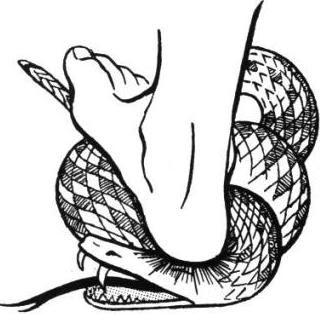Home Quiz
The Serpent and the Seed
The Battle for Christmas
Declaration of War

Genesis 3:14-16
Who or what is "the seed"? Let's look at some literal translations of 3:15:
KJV: And I will put enmity between thee and the woman, and between thy seed and
her seed; it shall bruise thy head, and thou shalt bruise his heel.
DRC: I will put enmities between thee and the woman, and thy seed and her seed: she shall crush thy head, and thou shalt lie in wait for her heel.
Vulgate: Inimicitias ponam inter te et mulierem et semen tuum et semen illius
ipsa conteret caput tuum et tu insidiaberis calcaneo eius.
וְאֵיבָ֣ה ׀ אָשִׁ֗ית בֵּֽינְךָ֙ וּבֵ֣ין הָֽאִשָּׁ֔ה וּבֵ֥ין זַרְעֲךָ֖ וּבֵ֣ין זַרְעָ֑הּ ה֚וּא יְשׁוּפְךָ֣ רֹ֔אשׁ וְאַתָּ֖ה תְּשׁוּפֶ֥נּוּ עָקֵֽב׃
Who does the bruising or crushing?
She or he? While the pronoun is ambigous without the vowel
points, the verb is definitely masculine, and agrees with the masculine gender of
"seed" in Hebrew. The Vulgate and KJV say "it" because Hebrew has no neuter
gender, and masculine is also used for neuter, and "seed" (semen) is neuter in Latin.
It is masculine in the Septuagint. Some Catholic writers insist that it is
feminine or ambiguous, but the doctors of the Church from Jerome on
seem to disagree with them. So the DRC seems to be in error, and most
Catholic translations reflect this.
Does the serpent bruise or "lie in wait for" ("be on the watch for")?
This is ambiguous in the Hebrew (without the vowel points added from oral tradition
in the middle ages. However, verse 16 is literally translated "a snare (lying
in wait) shall increase thy sorrow and thy sighing", and that is the reading
of the Septuagint. The difference between "a snare shall multiply" and "multiplying
I will multiply" is again only vowels. The former makes a Hebrew "rhyme" of
concept rather than sound with "lie in wait for", which characterizes all
prophecy in Genesis. The word translated "conception" (including in the
Vulgate), הֵֽרֹנֵ֔, is spelled הֵרָי֖וֹן everywhere else in the Old Testament. For
instance, Spurrell says: "It is an abnormal formation which occurs nowhere else
in the Old Testament." Lexical authorities Brown, Briggs and Driver call it a
"contraction, or erroneous." It is, however, the correct spelling for
"sighing". I conclude, supported by a minority of experts, that Jerome and the
King James committee erred and the Septuagint is again correct.
Revelation 12
- 12:1 a woman clothed with the sun, and the moon under her feet, and upon her
head a crown of twelve stars. Catholic art, I think correctly, depicts Mary
with these features.
- 12:4 to devour her child as soon as it was born. Cf Matthew 2:16.
- 12:5 she brought forth a man child, who was to rule
all nations with a rod of iron: and her child was caught up unto God, and to
his throne. Cf Psalm 2, this is clearly Christ, which again identifies
the woman as Mary (although many say Israel - the 12 stars being 12 tribes).
Christ crushes the serpent's head
- Galatian 3:16 Now the promises were made to Abraham and to his offspring. It
does not say, “And to offsprings,” referring to many, but referring to one,
“And to your offspring,” who is Christ.
- John 12:24 Very truly I tell you, unless a kernel of wheat falls to the ground
and dies, it remains only a single seed. But if it dies, it produces many
seeds.
- Isaiah 53:10 Yet it pleased the Lord to bruise him; he hath put him to grief:
when thou shalt make his soul an offering for sin, he shall see his seed,
His bride does also.

- Behold, I give unto you power to tread on serpents and scorpions, and over all the power of the enemy: and nothing shall by any means hurt you. (Luke 10:19 [KJV])
- Romans 16:20 And the God of peace shall bruise Satan under your feet shortly.
- Revelation 12:11 And they overcame him by the blood of the Lamb, and by the word of their testimony.

